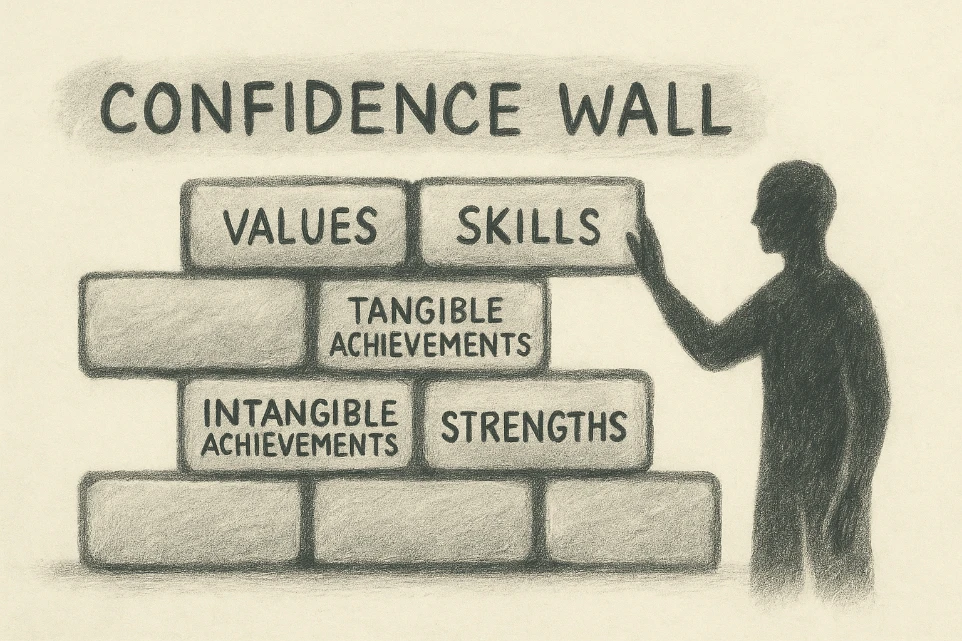Dealing with Lack of Confidence in a Coachee

How to help a Coachee develop their confidence
We all have moments when our confidence wobbles. When self-doubt creeps in and whispers, “What if I mess this up?” It might show up as shyness, uncertainty, or feeling like you’re not quite good enough. And when it does, it can hold us back from living fully and showing up as our best selves.
Confidence isn’t just a nice-to-have. It’s a key driver of performance, presence, and progress. And in coaching conversations, it comes up a lot.
Often, low confidence stems from low self-esteem. People may brush off their achievements, chalking them up to luck. They might feel like a fraud, waiting for the moment someone spots the ‘truth’ – that they’re not as capable as others think. That lingering fear of being ‘found out’? That’s imposter syndrome in action.
So how do we, as coaches, navigate this?
There are plenty of ways to support a coachee to build confidence – and many tools to help them reframe those inner narratives. We'll touch on a few practical coaching techniques shortly. And there’s a wealth of exercises online if you want to dive deeper.
But first, a word of grounding. It’s crucial to have a clear coaching contract in place. Know your own scope and competence when working in this space. Confidence work can take you into deeper emotional territory. That’s why it’s important to recognise the three levels that may emerge when coaching in this area.
Level One – that which is beneath
We all carry our past experiences with us, and some of these experiences from childhood and youth remain profoundly affecting into adult life, even at an unconscious level, and may have a powerful impact on our self-esteem. If the contract is for coaching, then it is not a contract for psychotherapy or counselling, unless explicitly agreed upon and within the competence of the coach.
Level Two – that which is behind
Most coachees are generally healthy coping adults, and who, given the opportunity for personal reflection and raised self-awareness, will have the capacity to appreciate, appraise and evaluate their own narrative and self-talk. At this level, coaches can work with individuals to understand what beliefs might be driving their lack of confidence, and what emotions those beliefs engender. This Level Two coaching can be very revealing and powerful without becoming too analytical or therapeutic but does require boundary management skills from the coach.
Level Three – that which is before
As the coachee begins to appreciate the drivers lying behind their lack of self-confidence, the coach can help them work on strategies that will build their esteem and enact behavioural change to allow the coachee to show up more confidently in specific situations.
This is the new ‘face’ that the coachee will be showing before the world. At this level, the coach may suggest daily practices, exercises or role play as ways of embedding new behaviours. The required commitment from the coachee would be to take more risks (involving potential ‘exposure’ or embarrassment) in order to develop resilience, and this will require a balance of appropriate challenge and support from the coach.
Coaches can contract and work effectively at Levels Two and Three with the coachees' confidence issues. Only trained therapists should contract at Level One, and in this case, it is not a coaching contract but a therapeutic one.
Some techniques to overcome a lack of confidence in a coachee
Assuming that the coach is clear they are working at Level Two or Level Three, then there are a number of approaches and techniques they can adopt to help the coachee, a few of which are described below:
Self-Confidence Review
This simple coaching approach can be initially a written exercise, followed by a coaching conversation.
Ask the coachee to complete a brief questionnaire comprising such questions as:
- What does self-confidence mean to you?
- When does your lack of confidence show up/in what situations? Give examples.
- Rate your confidence level on a scale of 1-10 and where would you like it to be?
- What would success look like, and what strengths or attributes do you need to develop to get to that point?
- What are your current mechanisms for coping? How can you enhance these?
Go through the coachees' answers in conversation with them to draw out more detail and build a relevant action plan.
Ellis’s ABCDE OF Rational-Emotive Behaviour
This technique is drawn from Ellis’s work in the field of Cognitive Behavioural Therapy and can be used in coaching in a light-touch way.
The ABCDE mnemonic stands for:
A – Activating agent (a problem, a stressor, an emotional trigger, a concern etc)
B – Belief system (challenge counter-productive or limited belief systems)
C – Consequences of A and B emotionally (rumination, self-fulfilling prophesies)
D – Disputing irrational thoughts and beliefs (replace negative, unrealistic thinking with
more realistic and adaptive appraisal of problem situations)
E – Cognitive and emotional effects of revised beliefs (practical action to solve the problem or has a less troublesome reaction to the situation)
Working through this simple five-step process with the coachee can help them identify where they are making illogical or irrational assumptions about circumstances and enable them to work on strategies to replace these with more positive and enabling thoughts.
Confidence Wall
The coach can work with the coachee to help them reflect on their achievements and then to build a ‘confidence wall’ which is simply a list of their core beliefs and achievements under the headings:
Values – what are your core beliefs/what is important to you?
Skills and Attributes – what do people admire about you/what are you great at?
Tangible Achievements – exams and education/awards/successfully completed projects?
Intangible Achievements – things you are proud of/feel good about/good things said to you?

Encourage the coachee to think of as many things as they can, no matter how small. Treat the exercise as a continual ‘work in progress’ which the coachee should add to whenever they think of something positive or affirming about themselves or their achievements.
The intention is to help the coachee realise that they have many positive attributes, achievements and skills that are already recognised by themselves and others and which they can build on with encouragement.
In addition to such techniques as those outlined above, the coach should be encouraging the coachee to be aware of, and work on, simple things which can make a big difference to their levels of confidence.
A list of such things might include:
- Presentation, posture and appearance: being well groomed and appropriately dressed can aid confidence
- Smiling and making eye contact are indicators of a self-confident person
- Complimenting others and finding/acknowledging positives in what others are doing
- Playing to strengths and doing more of what they are good at
- Being very clear about what they want to achieve and what success will look like
- Practicing and role playing for upcoming events and plan for worst case scenarios
- Developing the habit of perseverance
Using a multi-faceted approach such as this, coaching can make a significant impact on the coachees self-esteem and confidence, and give them practical ways to grow their confidence day-by-day.
___
If you're dealing with a lack of engagement rather than a lack of confidence in your team, maybe this article is for you: Unlocking Employee Engagement >

FAQ: Coaching a Lack of Confidence
1. How do I know if a coachee’s lack of confidence is within coaching scope?
If they’re dealing with daily self-doubt or fear of failure and those show up in behaviour, you’re in. But if old trauma or childhood wounds are swirling under the surface (that’s Level One territory), it’s therapy, not coaching. Contract carefully and know your boundaries.
2. What are the levels of confidence work in coaching?
- Level Two (behind): Exploring beliefs and inner narratives. Understanding the story that’s fuelling the doubt.
- Level Three (before): Working on practical change. New habits. Real risks. Small shifts in how they show up.
These levels help turn awareness into action.
3. What useful techniques help boost confidence?
- Self-Confidence Review: A short written reflection followed by a coaching conversation. It gets coachees clear on what’s holding them back.
- ABCDE Method: A CBT-style tool to reframe unhelpful thinking.
- Confidence Wall: A living list of strengths, values, and wins. A visual reminder they’ve got more to offer than they think.
4. What should coaches be mindful of when working on confidence?
Keep your contract front and centre. Confidence work can take people deep. Stay in your lane. Balance support with stretch. Create safety before you challenge.
5. What small daily habits can help someone feel more confident?
Think posture, eye contact, offering compliments, saying what they want, leaning into strengths, and practising for tough moments. Repetition builds ease.
6. How can coaches measure progress in confidence work?
Revisit their goals. Re-rate confidence levels. Spot the shifts. Maybe they’re speaking up more. Taking bolder action. Trusting their gut. Progress isn’t always loud, but it’s visible.
Summary: Turning Confidence Into Action
- Confidence is more than a feeling. It’s a pattern of thought, action, and choice.
- Coaches work at Levels Two and Three to help coachees challenge beliefs and build confidence behaviour by behaviour.
- Tools like the Confidence Review, ABCDE, and Confidence Wall bring structure to the work.
- Small, consistent steps create real momentum.
- With time and trust, confidence grows. And it lasts.
Discover More
Discover our leader as a coach programme and take your leadership to another level. Leader as a Coach Programme >
Trayton Vance
Trayton Vance is the Founder and Managing Director of Coaching Focus Group, one of the UK’s leading leadership coaching consultancies working with clients such as McDonalds, Beats by Dre, Paramount and many more.
Coaching Focus Group
Specialists in leadership coaching, workplace coaching programmes, and building coaching cultures that stick.
[FREE WEBINAR]
Feb 19 from 12pm to 1pm GMT

You might be interested in...


Employee Engagement Series












